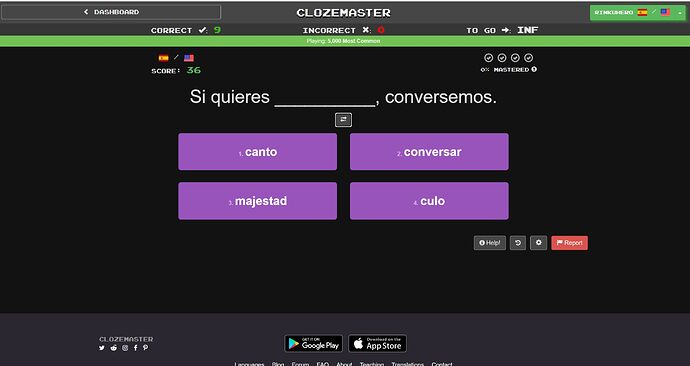Thank you to all of you who recently participated in the survey we sent out via email! One of the most requested features/improvements was “more challenging multiple choice options”.
Here’s what we’re considering at the moment:
For each sentence, come up with a list of
- X of the most “similar” words
- Y words of the same part of speech
- and Z random words
then select from that list at random when playing that sentence.
X of the most “similar” words
By “similar” words we mean if the answer is “dinero”, you might see “diera”, “ligero”, “dieron”, using Levenshtein distance to find words that require the fewest changes to get from one word to another. Here are a few more examples:
- estamos → estemos, estados, estas, estarás
- nadie → nació, nace, radio, nariz
- padre → pare, madre, padres, pase
- después → espías, espuma, deseas, desnuda
If you think it might be helpful to see any other examples please let me know.
Y words of the same part of speech
- estamos → tenemos, podemos, hemos, somos (plural first person present finite)
- nadie → nada (exact match for singular negative pronoun), él, lo, que (other pronouns)
- padre → bueno, solo, dios, dinero (masculine singular)
- después → no, aquí, ayer, más (adverbs)
A concern here is whether having all the options be the same tense for estamos, for example, is too exact and gives away the part of speech - perhaps the list should also include some that are verbs of any tense.
Z random words
Random words used as the multiple choice options is the current approach. It seems like it’s still helpful to have some random options.
So the list for estamos, for example, might end up being
estemos, estados, estas, estarás (“similar”) + tenemos, podemos, hemos, somos (same part of speech) + hazlo, físico, afuera, competición (random)
and so if you were playing {{Estamos}} aquí., you might see multiple choice options
- Estamos, Hazlo, Estemos, Podemos
or - Hemos, Somos, Estamos, Físico
or - Afuera, Estamos, Hazlo, Tenemos
or - Estamos, Afuera, Estados, Estas
What do you think? Would any other examples be helpful? Anything you think it might be helpful to include besides “similar” + same part of speech + random?
Any and all feedback and ideas welcome as always! Thanks again!
